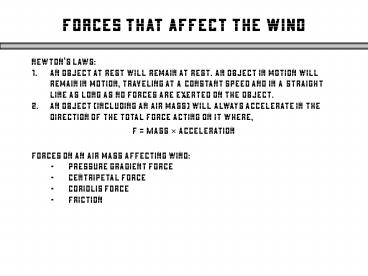Forces that affect the wind - PowerPoint PPT Presentation
1 / 14
Title:
Forces that affect the wind
Description:
An object in motion will remain in motion, traveling at a ... zonal winds. meridional winds. fast. slow. L. H. H. Forces that affect the wind. Surface winds: ... – PowerPoint PPT presentation
Number of Views:46
Avg rating:3.0/5.0
Title: Forces that affect the wind
1
Forces that affect the wind
- Newtons Laws
- An object at rest will remain at rest. An object
in motion will remain in motion, traveling at a
constant speed and in a straight line as long as
no forces are exerted on the object. - An object (including an air mass) will always
accelerate in the direction of the total force
acting on it where, - F Mass ? Acceleration
- Forces on an air mass affecting wind
- Pressure gradient force
- Centripetal force
- Coriolis force
- Friction
2
Forces that affect the wind
Pressure gradient force (PGF) - review The PGF
is a horizontal force which, acting alone, would
accelerate air from high towards low pressure
PGF
H (1030 mb)
L (1000 mb)
1 hr
2 hr
3 hr
40 m/s 80 mph
3
Forces that affect the wind
Pressure gradient force (PGF) - review On a
weather map, the PGF is strongest where lines of
constant pressure are closest together.
Fig. 6-11, p.151
4
Formation of Direct Thermal Circulation
Air flow from higher toward lower pressures occurs
a. at lower altitudes only b. at higher altitudes
only c. at both higher and lower altitudes
X
5
Forces that affect the wind
Centripetal force (CenF) The centrifugal force is
an apparent force felt by an object rotating
around a circle. The actual force is the
centripetal force keeping the object on a
circular path.
Apparent centrifugal force
Centripetal force needed to keep object going in
a circle
Direction of motion of rotating object
6
Forces that affect the wind
Coriolis force (CF) The Coriolis force, like the
centrifugal force, is an apparent force due to
the earths rotation.
Apparent force deflects ball to the right as the
merry-go-round turns counter-clockwise or
cyclonically.
7
Forces that affect the wind
Coriolis force (CF) Airplanes path
- Earth rotates counter-clockwise when viewed from
the NH - Airplanes path is deflected to the right
(southward for a plane headed from west to east)
in the NH, to the left in the SH. - Coriolis force increases from zero at the equator
to a maximum value at the poles (north or south
pole).
8
Forces that affect the wind
An airplane flying south in the northern
hemisphere
a. is deflected to the east b. is deflected to
the west c. could be deflected in either direction
X
9
Forces that affect the wind
- Coriolis force (CF)
- The Coriolis force only affects an objects
direction, never an objects speed. - The amount of deflection depends on,
- The rotation speed of the earth
- The latitude of the object
- The objects speed
- The Coriolis force acts at right angles to the
wind, only influencing wind direction. - The Coriolis force is negligible over short
distances, even for strong winds.
10
Forces that affect the wind
Straight-line flow aloft PGF vs. CF
1. Wind is set in motion by PGF
11
Forces that affect the wind
Winds around a low aloft PGF vs. CF vs. CenF
1. Wind set in motion by PGF toward low pressure
region
CenF
12
Forces that affect the wind
Winds around a high aloft PGF vs. CF vs. CenF
1. Wind set in motion by PGF away from high
pressure region
2
1
3
CenF
13
Forces that affect the wind
Review of an upper-level 500 mb chart
zonal winds
fast
L
slow
H
H
meridional winds
14
Forces that affect the wind
Surface winds
- The frictional force is present up to 1000 m and
reduces wind speed in this layer (boundary
layer). Effect is greater at 0 m than at 1000 m. - A reduction in wind speed also reduces the CF.
- Thus, the winds in the boundary layer point
slightly towards a L (away from a H), since the
CF is not exactly balancing the PGF.

